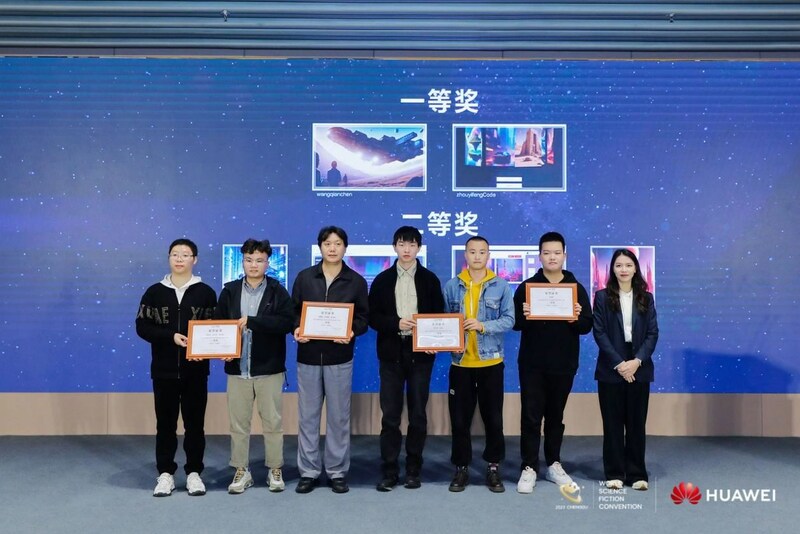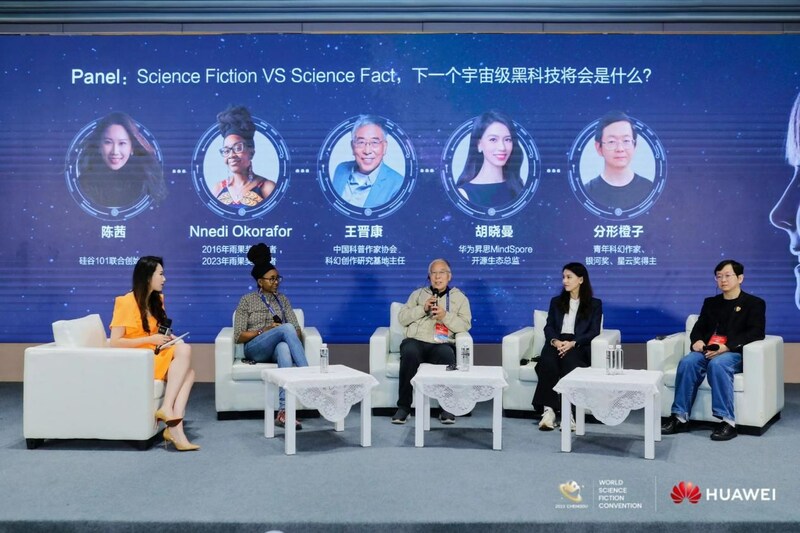Winners of the Wukong-Huahua AI Fine-Tuning and Application Competition, themed “Science Fiction and Creativity,” received awards from Huawei at the “Science Fiction vs Science Fact” Salon held at the Chengdu Science Fiction Museum. The Salon was hosted by Huawei during the 81st World Science Fiction Convention. The Salon’s panelists included Director of the China Science Writers Association’s Science Fiction Creation Research Center Wang Jinkang, Winner of the 2016 and 2023 Hugo Awards Nnedi Okorafor, and Winner of the Galaxy Award and Chinese Nebula Awards Yu Kun, as well as the Director of Huawei’s open source MindSpore Community Hu Xiaoman.
During the Wukong-Huahua AI Fine-Tuning and Application Competition, teams from around the world either fine-tuned the Wukong-Huahua model to create AI-generated content (AIGC) works or created applications based on the model. In the end, six teams stood out to win the first and second awards.
The Wukong-Huahua foundation model is a diffusion model that can generate images based on Chinese text. The model combines the MindSpore AI framework and Ascend Atlas hardware. It has been trained on the Wukong Dataset, which is the largest multi-modal, Chinese-language open source dataset in the world. The model can generate high-quality images depicting different scenes in a variety of styles.
Science fiction and technological advancement have long had a symbiotic relationship. While science fiction has encouraged generations of entrepreneurs and investors to create and support more innovative tech products, new scientific and technological advances have in turn prompted fiction creators to imagine ever more complex and compelling worlds.
Huawei’s Hu Xiaoman spoke at the Salon about how emerging technologies like foundation models are being applied in creative fields like the sci-fi literature. AI technology formerly was used by the community to better observe and analyze the world, but recent advancements in AI have turbocharged the technology’s ability to generate and create content. AIGC technology is rapidly maturing and has seen in-depth use in science fiction. According to Hu: “We should focus on what benefit technology can bring in tackling real-world problems, rather than see it as a source of misfortune.”
Yu Kun also said that technology has changed our world in profound ways. As new technologies emerge every day, he cautioned that theoretical breakthroughs in foundational science and technology are urgently needed and must be translated into real-world applications by companies like Huawei if we hope to unlock the technology’s full potential.
Dr. Nnedi Okorafor talked about the significance of science fiction in Africa, and specifically the impact it had on local technological development. She believes that science fiction works are the result of globalized creative thinking and that African science fiction provides a medium through which people can envision the future and explore how technology is likely to shape our society, economy, and politics.
In future, Huawei will continue to support the development of science fiction, enhance its technological strengths, and harness the power of technology to turn more science fiction ideas into reality. Huawei will also continue to explore the endless frontiers of science and technology, openly cooperate with the rest of the world, and apply ICT technology to all industries. By providing digital, intelligent, and green solutions, Huawei strives to create added value for industries and bring the benefit of technology to all.
Photo – https://mma.prnewswire.com/media/2262200/image_5019648_38947758.jpg
Photo – https://mma.prnewswire.com/media/2262201/image_5019648_38947868.jpg

